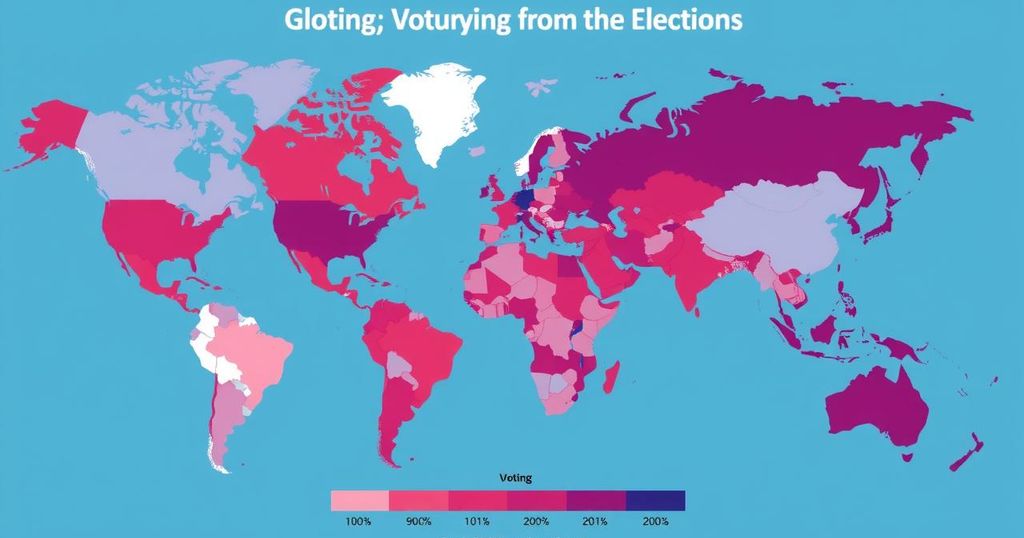2024 Elections: Global Voting Trends and Outcomes Revealed
The year 2024 featured notable elections worldwide, with significant events spanning from Bangladesh’s chaotic aftermath to historic victories in Mexico and the United States. While many nations witnessed substantial shifts in leadership, reported allegations of interference and political strife persisted in others. This varied electoral landscape reflects a broader discussion on the resilience and quality of democracy amidst evolving geopolitical realities.
In 2024, nations across the globe witnessed significant electoral events, ranging from contested elections to historic wins. In Bangladesh, Sheikh Hasina faced deadly protests after securing victory, prompting her flight to India. France was surprised by Marine Le Pen’s party faltering, while Mexico applauded Claudia Sheinbaum as its first female president. Iran saw a moderate reformist emerge after the unexpected death of the previous president. However, Romania’s election results were annulled due to allegations of foreign interference. India conducted an extensive voting process, recording around 642 million participants, ultimately granting Narendra Modi’s coalition a majority. The UK experienced a shift from the Conservative Party, and in South Africa, the ANC lost its majority for the first time since apartheid. In a controversial election, Vladimir Putin secured his position amid claims of suppression, while Nicolas Maduro faced protests after claiming re-election in Venezuela. The United States saw a significant upset with Donald Trump’s return to office, marking him as the second president to hold non-consecutive terms. Despite numerous setbacks, the commitment of citizens worldwide to democracy remains evident, alongside increasing protests against perceived electoral injustice.
Wider themes of insecurity and polarization were reflected across other regions, including Taiwan’s contentious elections against a backdrop of heightened tensions with China, and Georgia’s elections undermined by allegations of Russian interference. In contrast, South Sudan remained without elections due to ongoing conflict and instability. In Ireland, voter turnout fell to record lows amid a potential shift in governance. The Global State of Democracy Report indicates troubling trends in electoral integrity, yet underscores a global commitment to democratic principles despite rising protests. This dichotomy reflects a world grappling with profound political changes, fraught tensions, and an enduring struggle for democratic values.
The significance of the 2024 elections lies not only in the immediate outcomes but also in the broader political, social, and geopolitical ramifications they present. The year was marked by a series of elections that revealed stark divisions within and among nations. Issues such as electoral integrity, government legitimacy, and citizen engagement played critical roles in the unfolding drama of these electoral processes. The juxtaposition of newfound leaderships and enduring regimes illustrates both the highs of democratic progression and the persistent challenges that these democracies face. Global reports indicate a decline in the quality of elections, prompting questioning of democratic values across continents and a resurgence of civic engagement in response to electoral grievances.
The year 2024 showcased a vivid panorama of electoral dynamics across the globe, highlighting both triumphs and tribulations in the political landscape. While many nations celebrated significant milestones, such as historic leadership changes and record voter participation, others contended with turmoil, disputes, and allegations of manipulation. This juxtaposition of progress and regression emphasizes the complexities inherent in contemporary democracies. Despite visible challenges, the resilience of citizens in asserting their democratic rights remains a beacon of hope for the future of global governance.
Original Source: news.sky.com




Post Comment